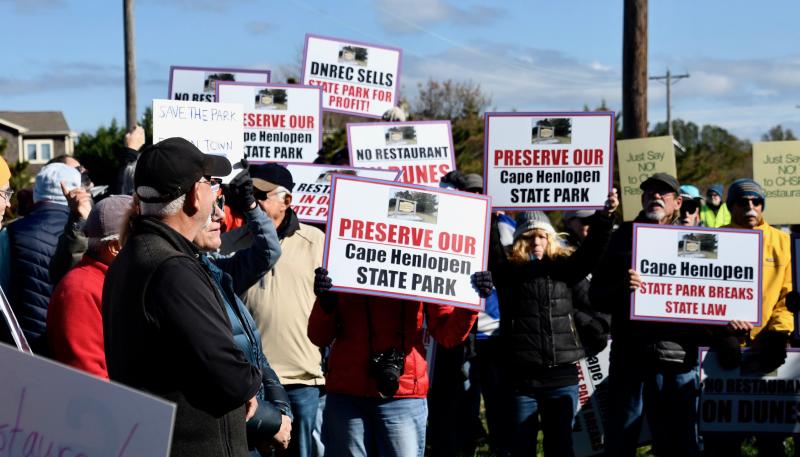Warner Grant could impact restaurant proposal
The Warner Grant Trust Lands have surfaced front and center in the debate over a proposed restaurant at Cape Henlopen State Park.
So what is the Warner Grant and why is it so important? To understand the grant, a history lesson is in order.
The key date in the grant's history is 1979. That year, the Delaware General Assembly passed legislation that the Warner Grant area would comprise 3,390 protected acres to be administered by the state’s Department of Natural Resources and Environmental Control for the benefit of the people of Lewes, Sussex County and Delaware.
Cape Henlopen State Park is included within the boundaries of the grant lands. Opponents argue that because of that unique designation, a commercial restaurant in the park does not comply with the law.
Group leads opposition
The grassroots group Preserve Our Park Coalition is mobilizing a campaign to halt the project. The group has spearheaded a letter-writing campaign to this newspaper and state officials. They held a protest march near the entrance to the park Nov. 13 attended by 225 people.
During a public comment period at a Nov. 3 Parks and Recreation Council meeting, DNREC officials heard numerous residents voice their opposition to the plan.
Opponents say the Big Chill restaurant, operated by La Vida Hospitality, at Delaware Seashore State Park cannot be compared to the proposed Cape park restaurant because of the stipulations of the Warner Grant and updated law do not include lands beyond the Cape area.
Coalition attorney Richard Abbott submitted his opinion on the grant to the commission.
He wrote, “The restaurant proposal is barred based upon the restrictions imposed upon the land in question by the Legislature in 1979.”
He said law states the lands must be administered for the public benefit as areas of recreation, conservation and/or nature education and may not be used for private benefit to the detriment of such public benefit.
Grant dates back to 1682
1682 – William Penn was deeded the lands of Cape Henlopen and the coastline by England's Duke of York. Penn then granted a petition from Edmond Warner to establish a rabbit warren and build a house on the lands with the stipulation that Cape and all its lands were to be for common usage by the people of Lewes and Sussex County, giving all of the lands to the public for recreation, conservation and/or nature education uses.
“The timber and feed of said land, and marshes thereunto belonging be and forever hereafter lye in common for the use of the inhabitants of the Town of Lewes and County of Sussex, as also free liberty for any and all of the inhabitants of the said county to fish get and take of their oyster and socket shells and gather plums, cranberries and huckleberries on the said land as they shall think fit always.”
1857 – The City of Lewes was named trustee of the lands.
1964 – The state gains 543 acres to establish Cape Henlopen State Park. That acreage has grown to 5,193 acres today.
1970 – The grant received its most serious challenge when the U.S. Army said it would flatten the Great Dune in the park and construct housing for vacationing personnel. On the first Earth Day in April, Cape Henlopen High School science teacher John Stenger and some of his students showed up to block the bulldozers and raise awareness that the land could not be developed. The Army backed down. Stenger said that learning about the Warner Grant should be required of all Sussex County students.
1979 – After several lawsuits and confusion about the lands included in the grant, the Delaware General Assembly passed Senate Bill 315 on July 5 to redefine the boundaries in two parcels totaling 3,390 acres. The Delaware Department of Transportation was to survey the boundaries and place monuments.
The law reads as follows:
“The Warner Grant Trust Lands shall be forever administered by the Department of Natural Resources and Environmental Control for the benefit of the people of Lewes, Sussex County and State of Delaware. Said lands must be administered for the public benefit as areas of public recreation, conservation and/or nature education and may not be used for private benefit to the detriment of such public benefit, subject, however, to use for railroad purposes existing at the time of this act.
“Any modification of the laws governing the Warner Grant Trust Lands shall require action by the General Assembly of the State of Delaware and approval of the Court of Chancery of the State of Delaware.”
1982 – The legislation was upheld by a Sept. 9 ruling by the Court of Chancery, dismissing two lawsuits that had been filed in 1972 and in 1974 against the Army's proposed plan.
Proposal under consideration
In February, La Vida Hospitality group was awarded a one-year contract to operate the concession area at Cape Henlopen State Park. The agreement includes an option to negotiate a 24-year amendment to construct a 6,300-square-foot restaurant at the northern end of the bathhouse parking lot. Those negotiations are ongoing. DNREC Secretary Shawn Garvin is expected to make a final decision on the proposal by Jan. 1, 2023.
Improvements to the bathhouse would be included in the project. The current bathhouse is 6,700 square feet.
During a June 13 workshop, DNREC officials unveiled the restaurant plans along with a series of other possible improvements totaling $79.9 million and covering nearly every venue the park has to offer. Last year, Cape Henlopen became the most visited park in Delaware with 1.7 million visitors, up from 1.3 million five years ago. Camping nights have increased nearly 90 percent over the past decade.
“The proposed project is currently in a planning process to explore and collect information,” said Shauna McVey, Delaware State Parks community relations coordinator. “The food service and bathroom at Cape Henlopen State Park are currently one of the division’s greatest areas of complaints about our state parks system.”
“If approved by DNREC, the new restaurant and bathhouse facility would be operational for the 2024 season. The existing McBride bathhouse would continue to be operational as well,” said Michael Globetti, DNREC media relations manager.
“Under the RFP award, La Vida has exclusive right to explore due diligence and project feasibility, and negotiate with DNREC for amendment or contract extension in the best interest of the state of Delaware and the Division of Parks and Recreation,” he said.





















































